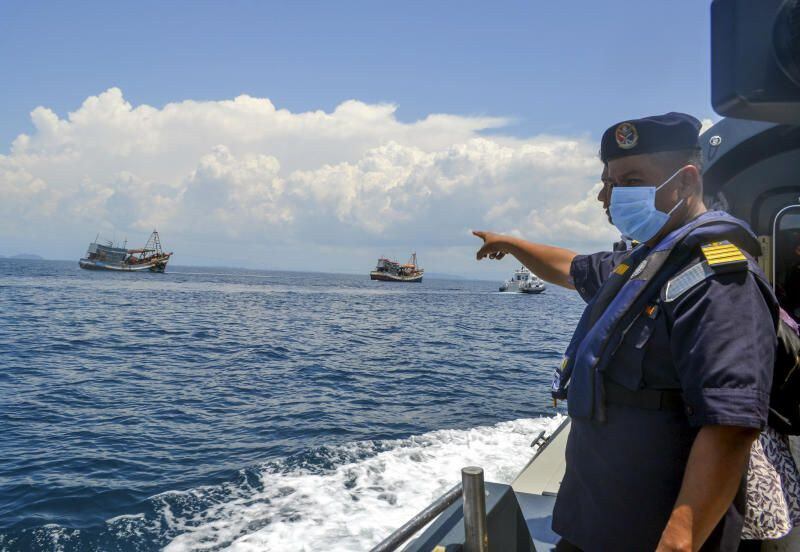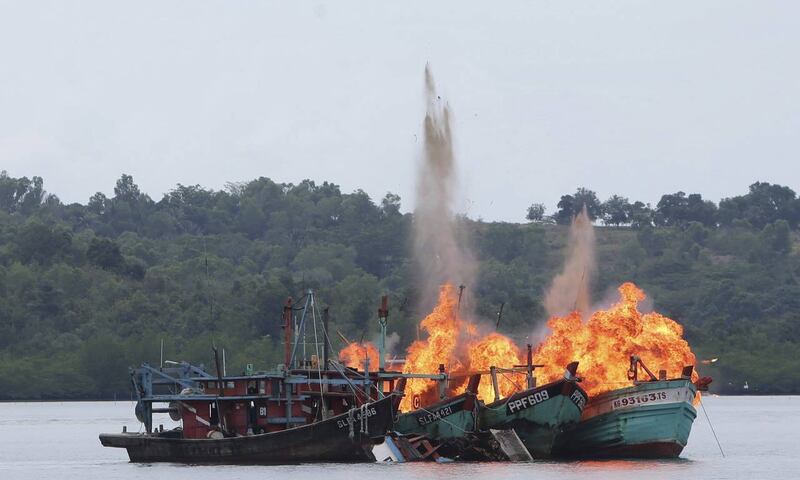One month after a Vietnamese fisherman was seriously wounded in a shooting incident near the Spratly Islands, authorities have yet to identify the attackers with some sources pointing to a possible piracy attack.
Vietnamese experts meanwhile are calling for a clear demarcation of maritime boundaries in the South China Sea, as well as a better cooperation mechanism in overlapping, disputed areas in order to avoid potential conflicts.
The fishing boat from Quang Ngai province with 12 crew on board was attacked by a group of armed foreign men on Sept. 9, about 40 nautical miles (74 kilometers) southeast of Pigeon Reef, a Vietnamese outpost in the Spratly Islands.
In the brief shooting that followed, one fisherman, 52-year-old Vo Minh Quan, was hit in the leg and may have to retire from fishing.
As the incident’s location was not far from Malaysia’s Sabah state, as well as the Philippines’ Palawan island, and also easily accessible from a rock occupied by China in the Spratlys, “it’s impossible to say where the attackers came from,” said Vu Thanh Ca, a former senior government official turned maritime analyst.
“They might even be pirates,” Ca told RFA in an earlier exchange.
A Malaysian expert seconded the suggestion, saying that, as the injured fisherman “was not brought back to Malaysian shores, it was unlikely that the Malaysian Maritime Enforcement Agency (MMEA) was involved.”
“In every case when the MMEA initiated shooting, it must be for self-defense and if the target is injured or dead they would be brought back to the Malaysian side,” said the expert who wished to stay anonymous because of the sensitivity of the issue.
An MMEA spokesperson told BenarNews that there were no Vietnam fishing vessels or Chinese fishing vessels spotted on the said date in the Malaysian waters in the South China Sea.
“No reports or no incident as such. It happened outside Malaysian waters,” said the spokesperson who cannot be named as he did not get clearance to speak to the media," the spokesperson said in a statement echoed by the Royal Malaysian Navy.
In another incident two years ago near Malaysia’s Kelantan state, a Vietnamese fisherman died after being shot by the MMEA. His body was brought to shore together with other crew members who were detained by Malaysia for illegal fishing, illegal entry and attempted murder as they resisted the authorities’ efforts to inspect their boat.

Armed robbery with military involvement?
In a separate development, the Malaysian Home Ministry said twenty people, including military personnel, have been arrested for piracy in the waters off Sabah state.
Malaysian media quoted Home Minister Hamzah Zainudin as saying that the detained were accused of two cases of armed robbery near Pulau Si Amil on Sabah's eastern coast on Aug. 15 and Aug. 18.
They have been released on bail as the investigation continues, Hamza was quoted as saying. The crime of gang robbery can carry prison sentences of up to 20 years as well as whipping.
Piracy and sea robbery have been a big problem in the waters around the Spratly Islands. In March 2017, a fisherman also from Quang Ngai province was shot dead by unknown assailants, probably pirates, in the area.
“Fishing is a hard job and a very unstable income source,” the fisherman injured in the Sept. 9 incident, Vo Minh Quan, told local media.
“It has been getting more difficult to catch fish in recent years,”Quan said, adding: “We’re also facing greater risks of being attacked by unknown vessels.”
Vietnamese fishermen operating in the South China Sea have also been chased and detained by law enforcement agencies from neighboring countries which hold overlapping, sometimes conflicting claims with Vietnam over certain areas of the sea.
Malaysia detained over 400 Vietnamese fishermen in 2021. In June this year, Malaysia detained 42 Vietnamese fishermen and released them after three months.
In 2021 alone Indonesia seized 42 Vietnamese fishing boats, sank some of them and detained more than 270 Vietnamese fishermen.
Unclear maritime borders
The European Commission issued a “yellow card” warning against Vietnam’s illegal, unreported and unregulated (IUU) fishing in 2017 and, despite the government’s efforts to eradicate illegal fishing, the results are far from desirable.
In the first quarter of this year, 19 fishing boats with 131 fishermen from seven provinces in Vietnam were caught by authorities from neighboring countries, detained and fined, according to the Vietnamese Ministry of Agriculture and Rural Development.
One of the main problems, according to Tran Cong Truc, a leading maritime expert and former head of Vietnam’s Border Committee, is that the boundaries between waters and continental shelves in certain areas in the South China Sea including between Vietnam and Indonesia, as well as between Vietnam and Malaysia in the south of the Spratlys, are not clearly defined.
“In some cases, they are set unilaterally by a single claimant therefore are not being considered legitimate and respected by others,” Truc told RFA.
‘Fluid borders’ cause grave misunderstandings, sometimes conflicts, between neighboring countries.
In the similarly named chapter of his highly-acclaimed book “The Outlaw Ocean”, journalist Ian Urbina described a heated confrontation involving both Vietnamese and Indonesian law enforcement vessels that he witnessed in 2017 in the waters between the two countries.
“In the days after the confrontation, I emailed James Kraska, an international law professor at the U.S. Naval War College in Rhode Island and an expert on the South China Sea. I sent him the coordinates of where the clash occurred and asked him whose waters those were. “Impossible to say,” he replied. Countries have to agree on where to draw these lines, he said. In the South China Sea, Indonesia and Vietnam have never come to such an agreement, he explained,” reads an excerpt of the book.

Vietnamese fishermen and law enforcement agencies all need to “learn thoroughly and in detail” about existing maritime boundaries in the South China Sea, including the unilateral and disputed ones, said Tran Cong Truc.
“The government should instruct relevant agencies to come up with different scenarios and regulations, to which fishermen should abide,” he said.
“Most urgently, we need to accelerate negotiations with other countries to either work out a final set of demarcations or a temporary joint development cooperation.”
The main goals are not only to ensure a deal that is fair for every country but also to protect the natural resources of the South China Sea, the Vietnamese expert said.
